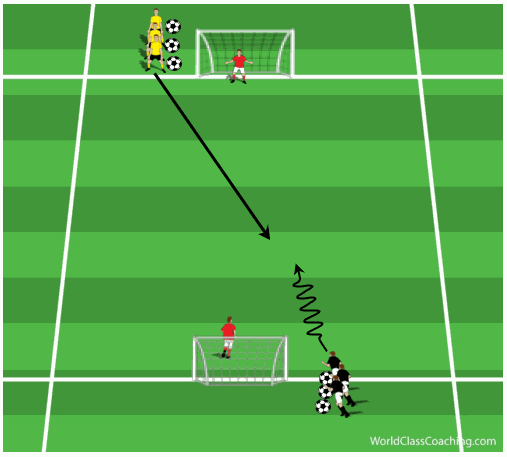Note: I don't like calling them drills, but to stay in the context of most sports and our terminology in North America, we'll use that term.
What does that mean?
A lot of coaches download drills, set up the cones, run the drill then move on to the next sequence. There is movement, touches on the ball, some direction on how the drill works and it's over.
Was there any coaching?
I also hear coaches watching a demonstration session say "what's so special about that? I run the same drill." OK, maybe that coach runs it, but how do they deliver it? To what level? Fabio Capello and Jose Mourinho use the same drills too ...but I am guessing the delivery might be different.
It's not the drill, it's how you coach/deliver it. Here's how you can make sure your drills and activities at training are more effective.
Some considerations for you when preparing a new or borrowed drill to be used in training.
Organization
- How many players do you have and how will the drill accommodate the group? Does it need to be modified?
- Does the layout of the drill allow for coaching and addressing the group? If you have 20 players and it involves 2 long lines of 10, will all the players hear you or see the demo?
- How does the organization mesh with the next or previous drill? Do you require full clean-up and setting up again? How much time will that take?
- How are balls introduced into the sequence? How are you set up to keep the drill going? How do you introduce a new ball if a ball goes astray?
- Where are spare balls kept in relation to the drill's layout? Can balls be reintroduced at different locations within the layout?
- Do you have enough equipment to deliver the drill?
- Does your coaching position allow you to see as much of the activity and players as possible?
- Are you in a position to quickly step in and out when making coaching points?
- Are you in the players' way? Is nothing more annoying than coaches who wander through a drill or small sided game. GET OUT OF THE WAY.
- Can the players hear you from where you are.
- Are you speaking into the wind? Are the players looking into the sun when looking at you?
- What are you looking to achieve with the drill? How will you know you have success unless you know what you're looking for?
- When your groups achieves success, how will you progress?
- If your group is struggling, how will you step backward to achieve success?
Coaching points
- Do you have specific message and, if so, coaching points to help get your message across?
- Can you identify appropriate coaching moments?
- Can you observe/identify/demonstrate/rehearse/continue when the moment arrives?
- Do you have your information in bite size chunks so the coaching moments are short?
- How picky will you be in relation to the skill level of the group?
- How much will you coach? ie. If you are running a 1v1 session, will you coach the attacking or defending aspect? How much will you coach the other to make your theme work?
- Can you demonstrate what you're coaching? If not, do you have somebody with you that can?
- Are you going to coach the pass on the serve if it's not right?
- Are you going to coach the attacker receiving the ball if it's not right?
- If the defending is weak, are you going to coach that?
- If the defender wins the ball, and doesn't advance quickly, will you coach that?
- How quickly will you address those points?
How will you adjust?
- You can serve the ball for the defender.
- You can make the service distance shorter by having a player half way to serve the ball.
- You can not worry about how good the defending is and coach the attacking.
- Make the grid narrower to help the defender in containing the attacker.
Experience will only make you better at adjusting on the fly, knowing when to coach or not and minor adjustments to make the activity work.
The internet has been a blessing to all sports in terms of coaches sharing information. Just make sure you know you have to put in a few minutes to shape it to work with your group.
P.S. My pet peeve: drill that leave most of the players waiting in line.








